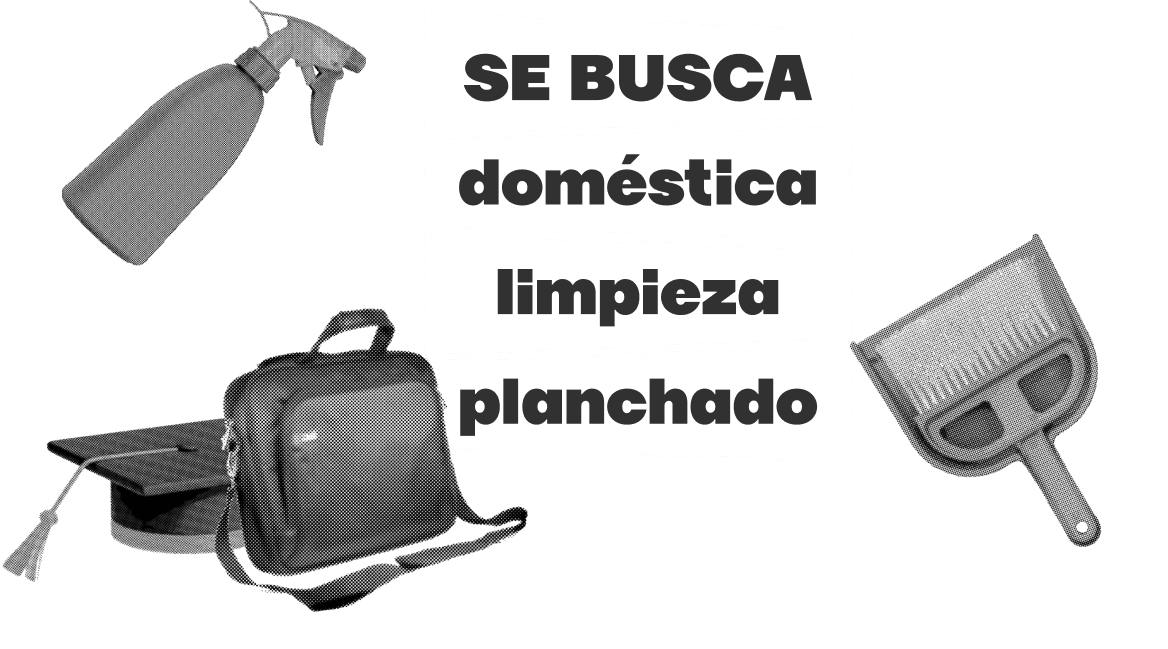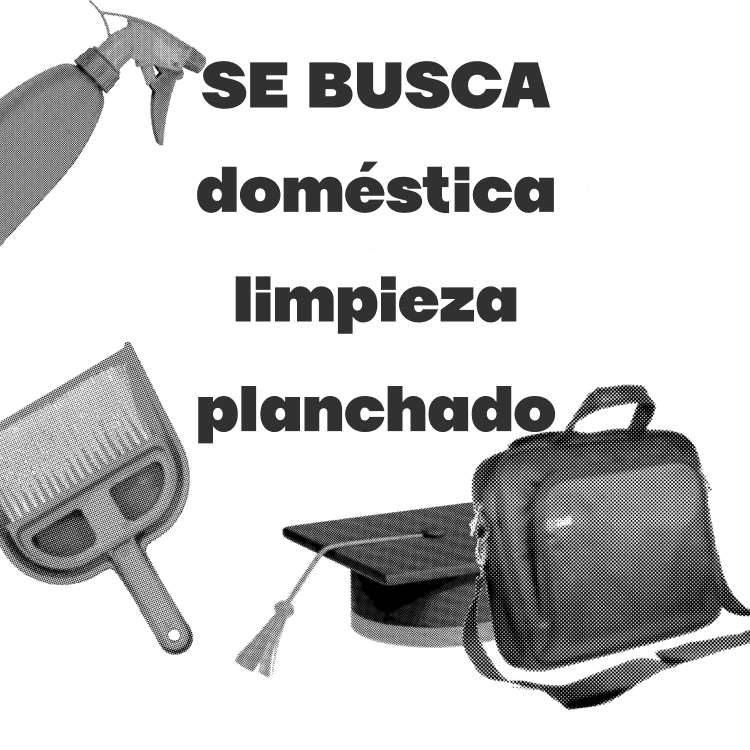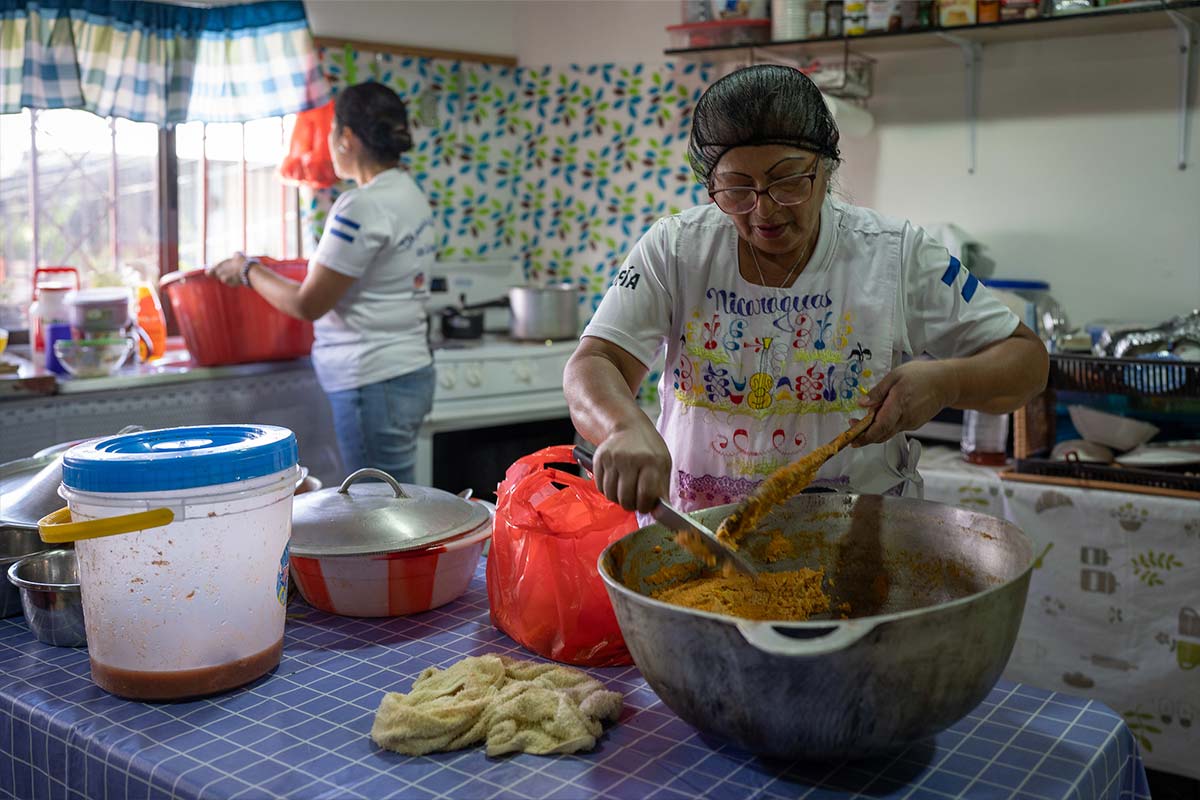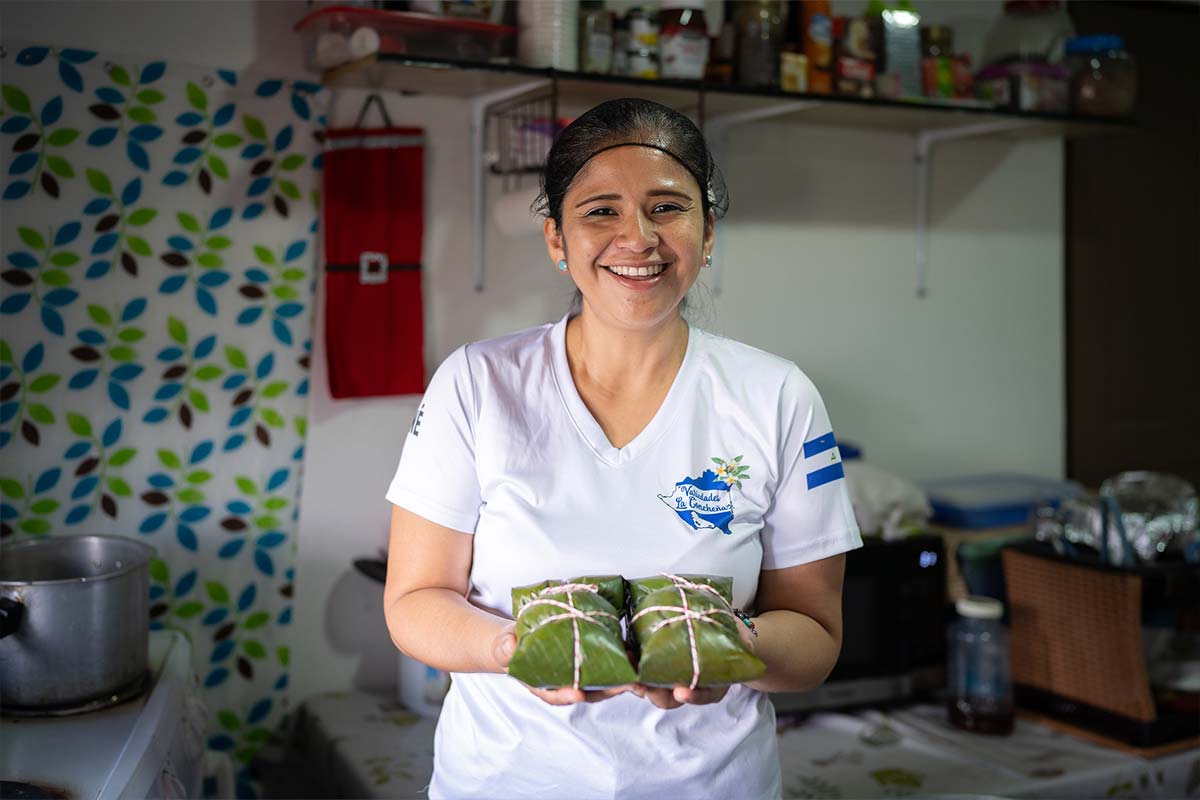Despite the academic and professional qualifications of Nicaraguan women who have migrated to Costa Rica since 2018, they struggle to access well-paid jobs, often working in precarious conditions, primarily focusing on home care and assistance




In the warmth of the kitchen fire, María René Mercado kneads the dough for nacatamales. She moves around a small space, sharing her recipe amidst laughter and stories.At the same time, a small speaker resonates with background music, part of her weekly ritual that repeats itself.
María René, wearing gloves, a cap, and an apron, showcases the expertise of her newfound occupation—a passion in Nicaragua turned into a means of survival in Costa Rica. Next to her, her mother cuts chagüite leaves in the dining area, preparing ingredients for the dough (masa), adding on to the conversation with laughter. Together, they create the flavors of Variedades La Concheña, a family business born four years ago out of unemployment.
While stirring the pot to prevent the masa from sticking, Mercado explains that her workday is long, starting well before this culinary ritual. Her workday begins in the morning as a domestic worker for a Costa Rican family, continuing even after arriving home at five in the evening, extending late into the night as she prepares nacatamales.

Her work doesn’t have weekends off either. Her job with a Costa Rican family ends on Fridays, but on Saturdays and Sundays, she focuses on delivering nacatamales and other products from their business. Despite her exhausting routine, 43-year-old Mercado mentions that she keeps both jobs to fully provide for her family’s needs, especially her two children. The business also serves as an income source for her mother, as her age limits other ways of earning money.
Living in an expensive country like Costa Rica and supporting an entire family is not feasible with a single income, she says, especially with the lower-than-minimum-wage salary of a migrant woman. Originally from La Concepción, Masaya, Mercado had never worked in domestic service in Nicaragua, as she had never needed to. Now, her daily life consists of working for another family and being the cook for her own business.
The precariousness and confinement to domestic and care-related work are not unique experiences for Mercado but shared by thousands of migrant women residing in Costa Rica, particularly Nicaraguans who fled the state violence unleashed by the dictatorship of Daniel Ortega and Rosario Murillo since 2018, states Claudia Vargas, sociologist and program officer at the Arias Foundation for Peace and Human Progress.
Unlike previous waves of Nicaraguan women migrating to Costa Rica, those who migrated from the beginning of the sociopolitical crisis have highly developed academic and professional profiles. However, the jobs they manage to access in the neighboring country remain poorly paid, with precarious working conditions, predominantly focused on household care.
“Women continue to access the same historical jobs. Regardless of the skills you bring, when you come to Costa Rica, they don’t matter. There is no recognition of your abilities, your academic merits, or the skills you managed to acquire. The only employment available for migrant women in Costa Rica is always in domestic care—caring for children and the elderly or working in house kitchens,” explains Vargas.
Despite almost six years since the start of the sociopolitical crisis in Nicaragua, resulting in an extreme migratory crisis, particularly to Costa Rica, the working conditions for Nicaraguan women have not changed much, according to Vargas. Sensitivity from employing individuals has increased, but everything else remains the same.
“For those whose conditions have changed, it has been for Costa Rican women, precisely due to the incorporation of migrant women into care roles. When Nicaraguan women take care of all the care responsibilities for your home and its members, it gives you, as a Costa Rican, the opportunity to study, work, or do other things,” she points out.
From 2018 to October 2023, there have been 222,511 asylum applications from Nicaraguans, according to data from the Directorate of Migration and Foreigners (DGME). While these figures are not disseminated by gender, the DGME has noted an increase in female migrants in recent years.
Moreover, working conditions for women worsen if their migration status is not regularized, and they lack work permits, leaving them exposed to informal jobs where their labor rights are at risk of multiple violations.
“If with a work permit, they are exposed to so many vulnerabilities in terms of labor rights, imagine when they look for work without a work permit, especially in jobs like domestic services, where they don’t ask for a work permit. The more exposed you are, the better for employers,” says the sociologist.
According to the Executive Decree 44293-MTSS of the Ministry of Labor and Social Security of Costa Rica, the minimum wage for domestic workers in 2024 should be 246,624 colones (482.38 dollars) per month. However, according to transgender activist Dámaso Vargas, wages for domestic workers are often below the minimum wage in many cases, reaching as low as 60,000 colones per month (117.35 dollars) in the least paid cases.
On the other hand, jobs in stores, common in Costa Rica, whose workers are mostly known as “gondoleros” or “gondoleras,” have shifts of up to twelve hours a day, exceeding the maximum weekly hours allowed by the Costa Rican Labor Code, which stipulates a maximum of 48 hours per week. They usually lack social security or other mandatory social benefits by law, and their labor rights are consistently violated due to lack of regularization.
“Sometimes there is no finish time, or if you get sick and can’t come to work, they fire you without pay. In the latter case, some women were violently assaulted by the employers,” says Vargas, referring to the case of the owner of SYR stores in Costa Rica, a Chinese businessman surnamed Lin, who assaulted two women with pipes in 2022.
While her mother ties the nacatamales and places them in the pot to be cooked, Mercado cleans the kitchen and any trace of leftover dough. Meanwhile, she sips on coffee and continues talking about her life in Nicaragua.
During her youth, she graduated with a degree in Engineering Systems, then focused on raising her children and working in accounting for her father. In 2018, her family provided food and attended to the wounded people participating in the roadblock located in El Recuerdo, in the municipality of La Concepción. She, along with a group of women, prepared three meals a day for those barricaded.
However, this act of assistance made them targets of persecution by the dictatorship and multiple threats from Sandinista extremists, forcing her to exile in July of that year with her mother and children to Costa Rica. “We went through four safe houses until we arrived here in Costa Rica on July 18, 2018,” she says.
One of the first things she did on Costa Rican soil was to apply for asylum and arrange her work permit. Her first job was the unpaid care of two nephews, but since then, she has “worked doing everything,” she comments. During that time, she worked in a “soda,” a small café; then in a minimarket; later, she worked as a domestic worker for another Costa Rican family until the coronavirus pandemic in 2020, and they suspended her because her employers suspected she had the disease.
“Many employers started firing their workers, and I was one of those because one of my relatives got infected with covid-19. They thought I had it too, even though my test came back negative. They suspended me for almost four months without pay,” she explains.
Although most people were affected by the pandemic-related lockdown, migrant individuals were particularly vulnerable to layoffs and suspensions by Costa Rican employers, according to Mercado.
“I couldn’t just sit back because food, rent, kids, everything kept going. So that’s when we decided to start a bit of everything,” she recounts. Thus, Variedades La Concheña emerged—a venture born out of “a bit of everything” and now focusing on Nicaraguan gastronomy and catering services.
She never considered the possibility of working in her field, she says, as she would have to pay for an updating course, which depending on the educational institution could cost more than $1,000 per course. The other option was to validate the classes she studied in Nicaragua and obtain a Costa Rican university degree, but this also required money and time.
“I decided to focus on what I had always liked, which was cooking and baking. I studied a technical degree in baking and one in cooking,” she indicates. She was able to study these thanks to social organizations that covered the expenses.
Although three and a half months after being unemployed, she found work again as a household assistant, the business has sustained her to date to meet her financial needs. The 135,000 colones (254 dollars) she earned monthly were not enough to pay the rent, which cost 145,000 colones (283.6 dollars) at that time.
Another reason why Nicaraguan women in Costa Rica are confined to domestic work and other poorly paid jobs is the lack of academic certifications from Costa Rican institutions, as in Mercado’s case. However, this situation is worse for Nicaraguan women who do not have university degrees but are qualified for certain jobs.
“It’s super difficult to find work for people coming from Nicaragua, who know how to do a lot of things but are not certified by academic institutions,” says activist Dámaso Vargas, who in Nicaragua worked as a promoter of sexual and reproductive rights in civil organizations.
For her, working in activism and surviving from it is impossible in Costa Rica. Due to persecution during the sociopolitical crisis for her human rights defense, Vargas had to exile to Costa Rica in 2019. However, finding a formal and stable job has been impossible for her in these almost five years of exile.
“In Nicaragua, I could live from doing activism. I could live working as a human rights defender, work for a civil organization, and have that organization pay me at least a minimum wage and social benefits. Here in Costa Rica, to be able to work, you must have a lot of technical training, which if you have them, you must have a certificate from a Costa Rican university proving it,” she states.
Although currently, 30-year-old Vargas continues to work in promoting human rights and sexual and reproductive rights, these jobs are in the form of consultancy or limited to temporary projects. For this reason, she has often had to work in cleaning homes and other domestic chores.
“There have been moments when I have lived on $300 a month. It’s hard to say that you will survive as a human in a country that is so expensive and technified like Costa Rica. Also, Costa Rica was twice as expensive as Nicaragua in 2019 when I came; now it’s 150% more. It puts us in a total regression in terms of access to decent work,” she expresses.
According to her, there have also been times when she had to choose between rent or food, especially during the pandemic. “You have to clean houses, wash dishes, be in a place like a waitress or kitchen assistant. In 2020, all of that closed. It was chaotic to get money for rent. The networks were activated, and many of us had to live on humanitarian aid,” she says.
Her survival strategy in Costa Rica has been to rely on support networks. “While in Nicaragua, I could have a certain lifestyle and meet my needs; here in Costa Rica, I had to live a regression of all those things,” she notes.

The decrees issued by Costa Rican President Rodrigo Chávez in November 2022 have also deeply affected Nicaraguan women and the entire migrant population, according to Vargas. The decrees state that migrants can only apply for asylum within the first 30 days of their entry into Costa Rica. They can only apply in person, and only 70 daily slots will be available.
In the case that the applicant has passed through a third country “considered respectful of human rights” and did not apply for asylum there, their application will be considered inadmissible.
This decree also prohibited asylum seekers from leaving the country, as this implies “the real absence of the need for international protection.” This regulation was declared unconstitutional by the Constitutional Chamber of the Costa Rican Supreme Court in February 2023.
However, what has most affected Nicaraguan migrants is access to work permits. The decrees state that work permits will not be immediately issued to asylum seekers, as was previously done. Instead, it will have to be processed three months after the asylum application, in case the request has not been resolved, and a series of requirements must be met.
Before obtaining the work permit, the asylum seeker must be registered with the Costa Rican Social Security Fund (CCSS). To do this, the applicant must already have an employer, who must provide a notarized letter containing their duties, hours, and salaries.
It is also required to show the income or balance of the company or employer, evidence that the company or employer is up to date with its obligations to the CCSS, and demonstrate certification indicating that the company or employer is up to date with the risk policy.
The decree also prohibits asylum seekers from engaging in self-employment. Although Nicaraguans can opt for the Temporary Special Category (CET), it can only be requested by individuals whose asylum application was filed before September 30, 2022, is pending resolution or was denied by March 2023, and the person has not left the country during their stay in Costa Rica.
“What comes to finish us off are the decrees approved by the president of the Republic. The Costa Rican system is telling us migrant women, ‘you are worth less every day here,'” says Vargas.

After a couple of hours, María René Mercado’s nacatamales are already on the fire, waiting to finish cooking. In her extensive itinerary, Mercado must deliver the products the next day and throughout the rest of the week.
In front of her living room entrance, she keeps a small table proudly displaying bags of pinolillo, cocoa, policereal, and other dry products made by her and her mother. Moving around, the Nicaraguan flag is also displayed, placed upside down by Mercado as a way of denouncing the crisis in her country.
“A piece of Nicaragua in your home,” says the printing on her shirt and all the other products containing the Variedades La Concheña logo. “People from La Concepción call us ‘Concheños’,” she clarifies the origin of her business’ name.
Entrepreneurship has been the last lifeline for Nicaraguan women who cannot find formal or well-paid jobs. In it, women resist in a suffocating economy and a state that increasingly closes its doors.
Many Nicaraguan women have been able to establish their small businesses thanks to the support of organizations that assist migrants and the Nicaraguan community in Costa Rica.
“Entrepreneurship is the only thing there is to survive; it is a survival strategy. They are not businesswomen; they still don’t have a big business. Having an entrepreneurial spirit is looking for a way to survive, to have something and contribute in some way to the home,” says sociologist Claudia Vargas.
For Mercado, it also means bringing her Nicaraguan home to Costa Rica and showing it to the people who eat her food. Since joining the Red de Mujeres Pinoleras in 2022, growing Variedades La Concheña has been her new goal.
Her next goal is to dedicate herself exclusively to her business when her eldest son finishes university. “In two years, I dream that my mom and I will retire and start dedicating ourselves only to our business,” she says. Meanwhile, she will keep both jobs for herself and her family.


